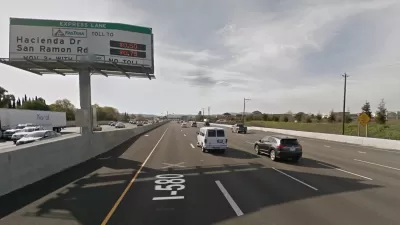Federal transportation leaders recognize that sustainable transportation funding options are needed to meet America's infrastructure needs. At AASHTO's Annual Washington Briefing, different funding strategies were proposed by key Congress members.
While Congress celebrated the passage last December of the first long-term transportation reauthorization bill since the 2005 bill, SAFETEA-LU expired in 2009, it is not resting on the funding problem. Sustainable options, rather than one-time subsidies like the $70 billion that props-up the FAST Act for five years are recognized by most to be necessary.
Four key transportation leaders from the House and Senate addressed the American Association of State Highway and Transportation Officials (AASHTO) Annual Washington Briefing on Capitol Hill held February 24 through February 26 on what they believe can fully fund transportation spending.
Rep. Sam Graves, R-Mo., chairman of the House House Transportation and Infrastructure Subcommittee on Highways and Transit, "made clear that he thinks the effort will eventually move toward VMT (vehicle-miles-traveled) pricing," writes the AASHTO Journal editor, commonly known as a VMT fee, road usage charge, or mileage-based user fee.
Graves said lawmakers should be able to agree on a funding solution in a year or two, and "I really believe we'll end up with some form of vehicle miles traveled (fee)."
Rep. Peter DeFazio (D-Ore.), ranking member of the House Transportation and Infrastructure Committee supports a different funding option, opting for a very indirect user fee that doesn't tax gasoline but adds "an upstream wholesale tax on the portion of oil used in transportation." President Obama recently proposed a similar type of funding option, a $10-per-barrel oil fee, for his transportation budget next year.
[He] cited some difficulties with adopting a VMT-type user fee across the country, including its complexity and the privacy concerns it raises for some.
DeFazio noted that Oregon has a major VMT pricing system pilot program [sic] under way.*
One problem with the wholesale oil tax is that it misses a growing component of the motor vehicle fleet, electric vehicles (EVs). Many states are tackling that problem by charging fixed, annual EV fees. Unlike a gas tax, there would be no difference between some driving a 1,000 miles a year, or 10,000 miles a year.
Four videos (click on Congress member or Senator) are available of the presentations to the AASHTO Annual Washington Briefing:
- Sen. Jim Inhofe, (R-Okla.) Chairman of the Senate Environment and Public Works Committee
- Senate Environment and Public Works Committee Ranking Member, Sen. Barbara Boxer (D-Calif.)
- Rep. Peter DeFazio, (D-Ore.) Ranking Member of the House Transportation and Infrastructure Committee
- Rep. Sam Graves, (R-Mo.) Chairman, of the House T&I Subcommittee on Highways and Transit
The T&I Committee will likely look for reports from the states on the VMT programs. For states considering embarking on their own mileage fee programs, "the FAST Act establishes the Surface Transportation System Funding Alternatives program, which provides up to $95 million to enable States to test and demonstrate innovative methods to fund needed infrastructure improvements," according to a January post.
*Correspondent's note: Oregon's pricing program, known a OReGO, is not a pilot—it's the real deal. ODOT already ran two pilot programs in 2007 and 2013. The new program is limited to 5,000 volunteers though. It will run until legislation ends it, unlike a pilot program which has a set termination date, such as the 9-month California Road Charge Pilot Program to begin in July.
FULL STORY: House T&I Leaders Say Panel Will Soon Begin Exploring Sustainable Funding Options

Alabama: Trump Terminates Settlements for Black Communities Harmed By Raw Sewage
Trump deemed the landmark civil rights agreement “illegal DEI and environmental justice policy.”

Study: Maui’s Plan to Convert Vacation Rentals to Long-Term Housing Could Cause Nearly $1 Billion Economic Loss
The plan would reduce visitor accommodation by 25% resulting in 1,900 jobs lost.

Planetizen Federal Action Tracker
A weekly monitor of how Trump’s orders and actions are impacting planners and planning in America.

Waymo Gets Permission to Map SF’s Market Street
If allowed to operate on the traffic-restricted street, Waymo’s autonomous taxis would have a leg up over ride-hailing competitors — and counter the city’s efforts to grow bike and pedestrian on the thoroughfare.

Parklet Symposium Highlights the Success of Shared Spaces
Parklets got a boost during the Covid-19 pandemic, when the concept was translated to outdoor dining programs that offered restaurants a lifeline during the shutdown.

Federal Homelessness Agency Places Entire Staff on Leave
The U.S. Interagency Council on Homelessness is the only federal agency dedicated to preventing and ending homelessness.
Urban Design for Planners 1: Software Tools
This six-course series explores essential urban design concepts using open source software and equips planners with the tools they need to participate fully in the urban design process.
Planning for Universal Design
Learn the tools for implementing Universal Design in planning regulations.
Caltrans
Smith Gee Studio
Institute for Housing and Urban Development Studies (IHS)
City of Grandview
Harvard GSD Executive Education
Toledo-Lucas County Plan Commissions
Salt Lake City
NYU Wagner Graduate School of Public Service



























